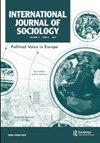Is the past a burden or a boon? The struggle for survival of communist-era youth and nature protection organizations in the Czech Republic, 1989–2019
IF 1.1
Q2 SOCIOLOGY
引用次数: 0
Abstract
Abstract After 1989, civic activity across Central and Eastern Europe (CEE) began to thrive in numerous organizations, some of which were created during the Communist era. Whereas many civil society organizations (CSOs) do not carry the legacy of the Communist past, we know little about how CSOs that were created during Communism survive after 1989: Is their historical legacy a burden to carry and a detriment to their survival? Or can they use that legacy to survive the new tumultuous civic environment? This qualitative case study of three youth and environmental organizations with a Communist past – Pioneer, Brontosaurus, and The Czech Union of Nature Protectors (CUNP) – builds on a synthesis of new institutionalism and regime change theories to investigate how, from 1989 to 2019, CSOs balance the old legacies, such as dealing with Communist history, their continuing dependence on the state, and the radical change in political discourse on voluntarism and CSOs. Case studies reveal that, in adapting to the times, the CSOs did retain some elements of their Communist past but had to obscure other elements of their history from the new actors who regard that legacy unfavorably. Whereas foreign actors do help shape CSO agendas, the state remains the central actor in shaping the post-1989 institutional environment.过去是负担还是恩惠?共产主义时代捷克共和国青年和自然保护组织的生存斗争,1989-2019
1989年后,中欧和东欧(CEE)的公民活动开始在众多组织中蓬勃发展,其中一些组织是在共产主义时代创建的。尽管许多公民社会组织(cso)没有继承共产主义过去的遗产,但我们对在共产主义时期创建的公民社会组织如何在1989年之后存活下来知之甚少:它们的历史遗产是否成为一种负担,是否不利于它们的生存?或者他们能利用这些遗产在新的动荡的城市环境中生存下来吗?本文对三个具有共产主义历史的青年和环境组织——先锋、雷龙和捷克自然保护联盟(The Czech Union of Nature Protectors)——进行定性案例研究,以新制度主义和政权更迭理论为基础,研究1989年至2019年,公民社会组织如何平衡旧遗产,如处理共产主义历史、他们对国家的持续依赖,以及关于自愿主义和公民社会组织的政治话语的根本变化。案例研究表明,在适应时代的过程中,民间社会组织确实保留了其共产主义过去的一些元素,但不得不掩盖其历史中的其他元素,使其不受新参与者的欢迎。尽管外国角色确实帮助塑造了公民社会组织的议程,但在塑造1989年后的制度环境方面,国家仍然是核心角色。
本文章由计算机程序翻译,如有差异,请以英文原文为准。
求助全文
约1分钟内获得全文
求助全文

 求助内容:
求助内容: 应助结果提醒方式:
应助结果提醒方式:


